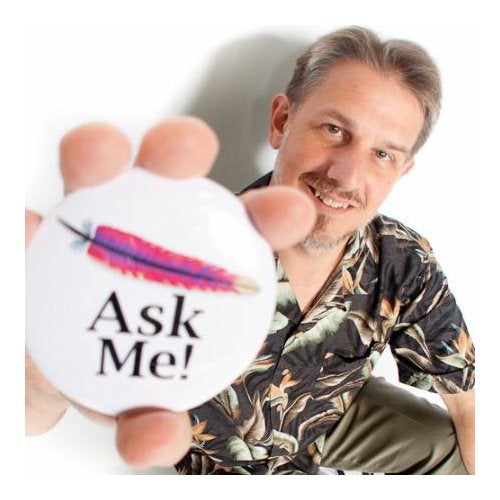
Shane is founder of Punderthings℠ LLC consultancy, helping organizations find better ways to engage with the critical open source projects that power modern technology and business. He blogs and tweets about open source governance and trademark issues, and has spoken at major technology conferences like ApacheCon, OSCON, All Things Open, Community Leadership Summit, and Ignite.
Shane Curcuru serves as VP Brand Management for the ASF, wrote the trademark and branding policies that cover all 200+ Apache® projects, and assists projects with defining and policing their trademarks, as well as negotiating agreements with various software vendors using Apache software brands. Shane is serving a seventh term as an elected Director of the ASF, providing governance oversight, community mentoring, and fiscal review for all Apache projects.
Otherwise, Shane is: a father and husband, a BMW driver and punny guy. Oh, and we have cats! Follow @ShaneCurcuru and read about open source communities and see my FOSS Foundation directory.

Authored Comments
Collaboration certainly is improved by getting everyone together; putting faces to email addresses always helps both understanding as well as tolerance and ability to work together. But what we're really talking about is collaborative governance of some actual product or chunk of code. Indeed, the operative word is getting your hands dirty - those who do the work are the ones doing the work - otherwise, it doesn't get done!
Similarly, collaboration is not generally about 100% consensus. Here, the difference between technical collaboration and everything-else collaboration can be broad.
- In terms of technical direction, you can usually get a consensus. Even if some people think it's a dumb idea, the question is: does this new code harm them? If your new silly feature still passes the tests and doesn't kill performance, then check it in. Not everyone needs to agree, but as long as those who don't agree are willing to not veto it, that's fine.
- Everything else collaboration is much more difficult. How should we setup the community code of conduct? Should we use email or a web forum? Who is allowed to use the project logo and how? These are social and business and governance questions, and it's much more difficult to get consensus on some of these. Again, the key thing is to listen actively, and respect other opinions, even if you disagree.
Pro tip: Provide a link to smile.amazon.com for book links on Amazon, instead of www. That way, people who have an Amazon Smile account setup are sent their directly - and people who don't might go see it. That way, a tiny percentage of sales goes to some charity.
The Apache Software Foundation participates in the Amazon Smile program, as do some other good causes!